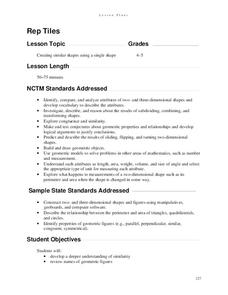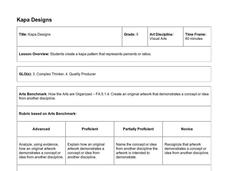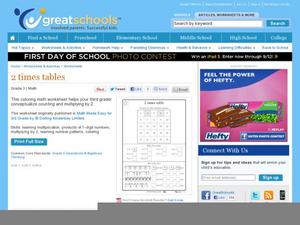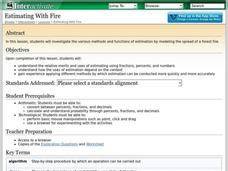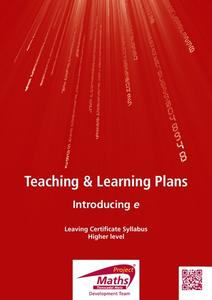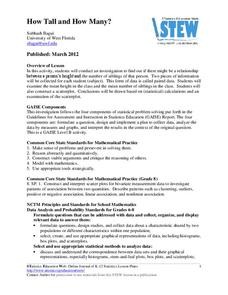Pennsylvania Department of Education
Using Polygons to Represent Fractions
Explore the world of fractions by using pattern blocks to show how different shapes can divide a hexagon. Elementary schoolers work in groups to complete these problems and to answer questions. Later, they work complete an independent...
EngageNY
Logarithms—How Many Digits Do You Need?
Forget your ID number? Your pupils learn to use logarithms to determine the number of digits or characters necessary to create individual ID numbers for all members of a group.
Alabama Learning Exchange
Binomial Expansion—Shortcut Please
There has got to be a better way; you just have to find it! Given a general binomial to expand with increasing powers, pupils realize that there must be a better way than multiple multiplications. Classmates look for patterns and use...
Improving Measurement and Geometry in Elementary Schools
Rep Tiles
In addition to the catchy title, this lesson plan provides upper graders an opportunity to more closely scrutinize the attributes of plane figures. In particular, they focus on the similarity of different shapes. Both whole-class and...
Hawaiʻi State Department of Education
Kapa Designs
I always knew there was a connection between art and math, and this activity proves it. Fifth graders will use what they know about ratios and percents to design art inspired by Polynesian kapa cloth. A grid, specific guidelines, and the...
Willow Tree
Factoring Polynomials
Young mathematicians discover trees organize more than just families — they help factor, too. The lesson begins with factor trees and develops slowly to factoring by grouping and special patterns.
Education Development Center
Consecutive Sums
Evaluate patterns of numbers through an engaging task. Scholars work collaboratively to determine a general rule reflecting the sum of consecutive positive integers. Multiple patterns emerge as learners explore different arrangements.
Concord Consortium
Integer Solutions
Experiment with integer relationships. Young scholars consider integers that have a sum of 10. They begin with two integers, then three, four, and more. As they consider each situation, they discover patterns in the possible solutions.
Curated OER
Multiplication
Students practice their multiplication facts by reinforcement and repetition. Students write facts in their math journals, and use labeled soccer ball and deck of cards to practice multiplying by "number of the day." Play continues until...
Curated OER
Explore Subtraction
Learnersare given 26 tables and graphs in which they must fill in missing numbers and graph equations. They subtract a given value of x from a constant number, and use a number line to subtract larger numbers from smaller ones resulting...
Curated OER
Getting it Right! An Investigation of the Pythagorean Theorem
In order to learn about the Pythagorean Theorem, young mathematicians investigate relations and patterns between different sides of a right triangle to look for possible relations among the squared sides. Once they have established the...
Curated OER
Multiples
A great worksheet for scaffolding critical thinking about mathematical concepts. This resource provides students with a brief explanation of multiples followed by 29 practice problems which gradually increase in difficulty. Several...
Curated OER
Addition Word Problems 1, Version 1
In this addition worksheet, students solve word problems containing one and two digit numbers. Students complete 5 addition word problems.
DK Publishing
2 Times Tables
Third graders count, multiply, and color their way to success. Not only do they practice multiplying two by various numbers, they color in a table to fully understand the two-times table, as well as counting sets of two ears on different...
DK Publishing
Learning 10 - Write the Number
Already covered numbers 0-9? It's time to focus on 10 with this set of exercises. First, youngsters trace the number 10 three times and try printing it a couple of times on their own. Next, they count five sets of bottles and write the...
DK Publishing
Learning 9 - Write the Number
As novice counters learn numbers 0-10, use this exercise to focus on the number nine. They begin by tracing and printing the numeral several times. Next, learners count sets of stars and record the totals, all of which are nine....
Shodor Education Foundation
Estimating With Fire
Watch the damage from a forest fire in this interactive simulation activity that challenges learners to estimate the burn area using different approaches. Learners are given a worksheet to track the different burn patterns and practice...
Project Maths
Introduction to e
First there was pi and now there's e. A discovery-based lesson helps learners find a pattern in compound interest as the compounding period changes. Their investigation results in the discovery of the number e. The lesson is the first in...
Curated OER
Conversion Tables
Here are some practical conversion scenarios for scholars to figure out. They examine an example table converting cents to dollars before completing two of their own. For the first, learners convert weeks to days. Some of these are done...
DK Publishing
Multiply or Divide? Part 2
Explore the relationship between multiplication and division as scholars fill in these number sentences, each of which is missing a symbol. Is it a multiplication or division equation? There are 18 of these to start, all written...
Illustrative Mathematics
Hand Span Measures
How long is your hand span? Young mathematicians measure their hand span from pinky tip to thumb tip using a centimeter ruler. After rounding to the nearest whole centimeter, learners plot their data on a line plot.
American Statistical Association
How Tall and How Many?
Is there a relationship between height and the number of siblings? Classmates collect data on their heights and numbers of brothers and sisters. They apply statistical methods to determine if such a relationship exists.
Alabama Learning Exchange
Introduction to Division
Examine how addition, subtraction, multiplication, and division relate to and are separate from each other. As they listen to the book, The Doorbell Rang, they demonstrate the math described in the story by cutting up paper cookies and...
EngageNY
The Multiplication of Polynomials
If you can multiply multi-digit integers, you can multiply polynomials. Learners use an area model to compare multiplying numbers to multiplying polynomials. They progress to using the distributive property.





